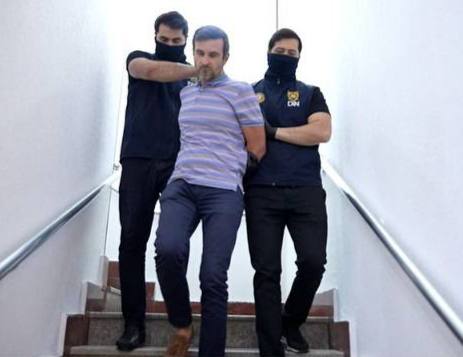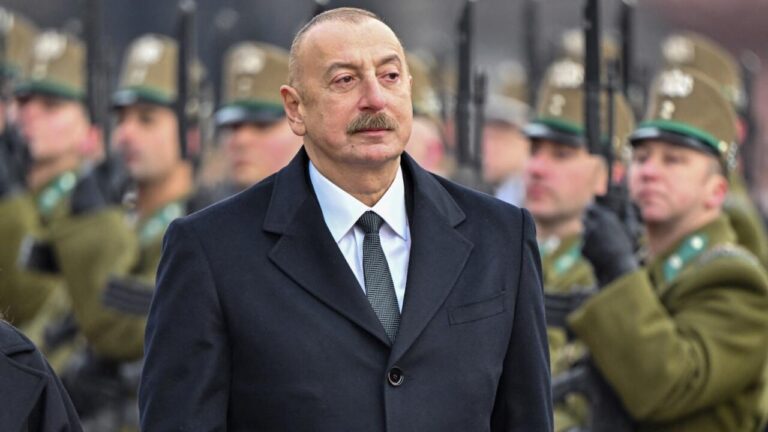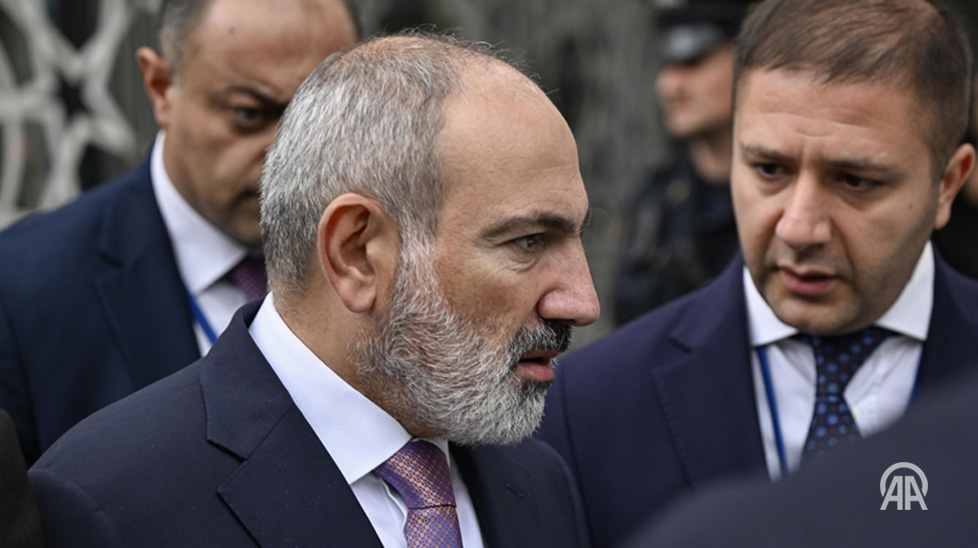1) The trigger: Aliyev’s August message
On Aug. 21, 2025, President Ilham Aliyev said Azerbaijan “must always be ready for war,” touting expanded special forces, new commando units, upgraded aircraft and fresh fighter-jet contracts. The line was delivered in Kelbajar (Karabakh) and repeated across state and regional media.
Did he mean Russia?
The phrasing was generic, but two data points point Moscow-ward:
- In a late-August interview with Al Arabiya, Aliyev called the 1920 Soviet takeover an “occupation,” one of Baku’s sharpest rebukes of Russia in years—prompting a barrage from Russian outlets
- Baku (and Kyiv) accused Russia of deliberately striking SOCAR oil facilities in Odesa this month—an unmistakable signal Moscow is prepared to hurt Azerbaijani assets far from the Caucasus.
Bottom line: He did not name Russia, but the venue (Karabakh), timing, and concurrent Russia-related grievances make the Kremlin a key implied contingency—alongside Armenia and Iran.
2) The history that frames it
- Azerbaijan–Armenia: Wars in the early 1990s and 2020, then Baku’s Sept. 2023 lightning operation re-taking Karabakh; Russian “peacekeepers” later withdrew. The conflict remains live over borders/Syunik and transit routes
- Russia’s role: Once the security broker, Russia is now distrusted in Baku—both for failures in 2020–23 and for current coercive signals (media pressure, arrests, energy-theater strikes). Relations slid further in June–July 2025 amid detentions on both sides and the raid on Sputnik Azerbaijan
3) Russia’s propaganda against Azerbaijan
Pro-Kremlin channels have framed Baku as “Western sellouts,” “Russophobes,” and tools of pan-Turkism/Israel, especially after Azerbaijani aid to Ukraine and Aliyev’s historical remarks. Russian outlets and amplifiers accused Baku of rewriting history and threatened retaliation. Azerbaijan, in turn, flagged fake/deepfake content aimed at souring ties
4) Who stands with Azerbaijan?
- Türkiye — Treaty-level ally under the Shusha Declaration (2021), commonly read as a mutual-assistance pledge; extensive defense-industrial and training links
- Pakistan — Consistent political/military backing; deepening defense ties (e.g., JF-17 track.
- Israel — Longstanding arms and ISR supplier (loitering munitions, UAVs, radars
- EU — Not a military backer, but energy interdependence gives Baku leverage (MoU to double gas by 2027, though financing and green policy complicate
- on SOCAR facilities.
5) Scenarios of conflict development (ranked by likelihood)
A) Gray-zone escalation (high)
- Information war and coercive law-fare (media raids, visa frictions).
- Energy-theater pressure outside the Caucasus (e.g., more hits on SOCAR assets in Ukraine).
- Cyber/EW harassment and selective trade nuisance.
Rationale: Cheap, deniable, and already visible.
B) Armenia-front relapse (medium)
- Border skirmishes in Syunik or along the eastern frontier if the peace text stalls; Moscow agitates via propaganda and limited facilitation rather than overt force.
C) Direct RU–AZ kinetic clash (low)
- Unlikely: Baku’s deterrent triangle (Türkiye–Pakistan–Israel) and Russia’s bandwidth limits argue against open war; risk is maritime/Caspian incidents or plausibly deniable strikes. (Analytic inference based on force-posture and current theaters.)
6) Domestic priorities in Baku that shape risk
- Deterrence credibility after 2023 victory (why the “ready for war” line plays well).
- Energy diplomacy with the EU (Baku wants long-term offtake to fund corridor expansion).
- Managing Iran while counter-pressuring Armenia without alienating Western buyers.
7) Is Türkiye’s shelter program linked to this?
Mostly no. Ankara’s nationwide modern-shelter push is tied to broad civil-defense planning after the Israel–Iran war scare and wider regional risks—not a single Azerbaijan-Russia scenario. It also dovetails with disaster preparedness after the 2023 earthquakes.
8) What to watch (indicators)
- More Russian strikes on Azeri-owned energy assets beyond Odesa
- Russian media/legal salvos vs. Azeri diaspora and business networks
- Whether EU long-term gas financing moves (or stalls), shaping Baku’s room to maneuver
- Armenia track: border demarcation and any fresh mobilization cues
Aliyev’s “ready for war” line is a multi-audience signal: deterrence toward Armenia, resolve toward Russia (after SOCAR hits and propaganda pressure), and reassurance to domestic and allied audiences that Baku’s edge endures. Expect gray-zone escalation and information warfare to dominate; a direct RU–AZ fight is unlikely while Türkiye’s alliance, Pakistan’s backing, Israel’s kit, and EU energy links raise the costs for Moscow.
Direct Russia–Azerbaijan clashes are still low probability compared to gray-zone competition, but there are a few plausible scenarios where they could erupt:
1. Karabakh and Border Re-escalation
- If border demarcation with Armenia stalls or if clashes flare in Syunik/Zangezur, Russia could decide to intervene more directly, especially if Yerevan invokes security ties with Moscow.
- Even after Russian peacekeepers left Karabakh, Moscow maintains intelligence and networks in Armenia. A flare-up could put Russian and Azerbaijani units or proxies into direct contact.
2. Attacks on Azerbaijani Energy Assets
- August 2025 strikes on SOCAR facilities in Odesa were widely blamed on Russia. If Moscow escalates with further strikes on Azerbaijani-linked energy infrastructure—whether in Ukraine, Georgia, or the Caspian—Baku might respond militarily (cyber, drone, or covert).
- This risks tit-for-tat retaliation spilling into Caspian maritime incidents between naval or coast-guard units.3. Information Warfare Escalating into Security Confrontation
- Russia is running propaganda campaigns painting Azerbaijan as a Western/Israeli proxy. If Moscow steps up with deepfake attacks, diaspora harassment, or provocations against Azerbaijani businesses, Baku might respond with expulsions of Russian officials or restrictions on Russian media.
- That can spiral into security incidents involving embassies, consulates, or critical Russian assets in Azerbaijan.
4. Iran Factor
- Moscow and Tehran coordinate closely. If Iran–Azerbaijan tensions (over borders, corridors, or Israeli presence) spike and Baku escalates, Russia might move forces or assets to “support Iran.”
- This creates a triangular risk where Azerbaijan confronts Iranian units but clashes indirectly with Russian advisors, drones, or mercenaries.
5. NATO/Türkiye Trigger
- Türkiye’s Shusha Declaration is essentially a security pact with Baku. If Russia sought to intimidate Azerbaijan militarily, it risks a Turkish response.
- In such a chain, Russian–Azeri clashes could occur as by-products of a larger Moscow–Ankara confrontation—though both sides would try hard to avoid it.
6. Ukraine Theater Spillover
- Azerbaijani assistance to Ukraine (energy, humanitarian, quiet defense cooperation) already irritates Moscow.
- If Baku openly increases military aid to Kyiv, Russia might retaliate by targeting Azerbaijani transport routes or diaspora networks—again creating opportunities for direct confrontation.
Bottom Line
Clashes between Russia and Azerbaijan are most plausible in indirect theaters (Ukraine, Caspian, border corridors)rather than a declared war. The Kremlin’s toolkit will likely remain coercive but deniable—propaganda, strikes on energy assets, cyber, proxy moves via Armenia or Iran.
Direct military confrontation remains unlikely, unless Azerbaijan’s partnerships with Türkiye and Israel expand into overt defense commitments that Moscow decides it must challenge.
Russia’s propaganda against Azerbaijan today shares several striking similarities with how it targeted Ukraine before the full-scale invasion in 2022:
1. Delegitimization of the State
- Ukraine (pre-2022): Moscow pushed the line that Ukraine was an “artificial state”, incapable of sovereignty, and that it owed its existence to Russia/USSR.
- Azerbaijan (2025): Russian media have begun portraying Azerbaijan’s independence as tenuous, with references to the “1920 Soviet rescue” and claims that Baku is rewriting history. Aliyev’s remarks about Soviet occupation triggered a storm of narratives about Azerbaijan being an “ingrate” and a “failed client of Moscow.”
2. Accusations of Russophobia
- Ukraine: Kremlin outlets endlessly described Kyiv as “Russophobic,” “neo-Nazi,” and hostile to Russian language/culture.
- Azerbaijan: Similar rhetoric: Russian outlets now brand Baku’s leadership “Russophobes,” accusing it of joining a Western/Israeli-Turkish front to undermine Russia in the Caucasus.
3. Framing as a Western/Foreign Proxy
- Ukraine: Portrayed as a puppet of NATO, the EU, and the U.S., used as a battering ram against Russia.
- Azerbaijan: Cast as an instrument of pan-Turkism, Israel, and the West—a pawn for Western gas diversification and Turkish military ambitions.
4. Historical Revisionism Charges
- Ukraine: Moscow accused Kyiv of “falsifying WWII history,” erasing Russian contributions, and venerating “fascists.”
- Azerbaijan: Aliyev’s labeling of the Soviet era as “occupation” was seized upon as “historical revisionism,” with Russian commentators warning that such narratives are “dangerous” and “provocations.”
5. Threat Inflation
- Ukraine: Before 2022, Russian propaganda claimed Kyiv was preparing to “invade Donbas” and posed a “security threat” to Russia itself.
- Azerbaijan: Similar alarmist claims now circulate—that Baku, together with Türkiye and Israel, threatens “regional stability” and could attack Armenia or even Russia’s interests in the Caspian.
6. Weaponization of Minorities
- Ukraine: Moscow emphasized the alleged persecution of Russian-speakers and ethnic Russians in Donbas and Crimea as justification for intervention.
- Azerbaijan: Propaganda increasingly highlights supposed “threats” to Russian communities in Azerbaijan, and occasionally hints at “concern” for Armenian minorities, positioning Russia as a “protector.”
7. Narrative of Betrayal
- Ukraine: Framed as an ungrateful neighbor that turned its back on centuries of shared history.
- Azerbaijan: Branded as “betraying” Russia’s role as mediator in the 2020 and 2023 Karabakh wars, despite Moscow’s “help,” and instead siding with NATO/Türkiye/Israel.
🔑 Conclusion
The pattern is unmistakable: Russia is recycling its pre-war Ukraine playbook against Azerbaijan—delegitimizing its sovereignty, framing it as a Western proxy, accusing it of Russophobia, and inflating threats to justify potential coercive actions.
The key difference: unlike Ukraine in 2021–22, Azerbaijan has Türkiye’s binding security guarantee (Shusha Declaration) and robust defense links with Pakistan and Israel. This makes a full-scale Russian invasion unlikely, but the propaganda similarities suggest Moscow is preparing the ground for gray-zone aggression (energy strikes, disinformation, diplomatic isolation) rather than open war.
side-by-side comparison table showing the similarities between Russian propaganda against Ukraine before the 2022 invasion and against Azerbaijan in 2024–25.
📊 Propaganda Narratives: Ukraine vs. Azerbaijan
| Theme | Ukraine (2014–2022) | Azerbaijan (2024–2025) |
| Delegitimization of Statehood | Ukraine called an “artificial state”created by Bolsheviks, incapable of real sovereignty. | Aliyev’s claim of “Soviet occupation” sparked backlash; Russian media frame Azerbaijan as historically dependent on Moscow. |
| Russophobia Label | Kyiv branded as “Russophobic” and “anti-Russian.” | Baku depicted as “Russophobic,” hostile to Russian culture, and ungrateful for Moscow’s role in Karabakh. |
| Proxy Narrative | Ukraine cast as a NATO/US puppet, “Western battering ram” against Russia. | Azerbaijan portrayed as an instrument of pan-Turkism, Israel, and the West (gas diversification, Turkish military corridor). |
| Historical Revisionism | Accusations Ukraine was falsifying WWII history and glorifying Nazis. | Baku accused of falsifying Soviet history and erasing Moscow’s role in “protecting” the Caucasus. |
| Threat Inflation | Claimed Ukraine was preparing to attack Donbas or Crimea, posing an existential danger. | Claims Azerbaijan threatens Armenia’s survival and undermines “regional stability” with Turkish and Israeli support. |
| Minority Protection | Alleged persecution of Russian-speakers justified interventions in Crimea/Donbas. | Narrative of Russia as “protector” of Armenians and Russian communities in Azerbaijan. |
| Betrayal Frame | Ukraine branded an “ungrateful brother” betraying centuries of unity. | Azerbaijan depicted as betraying Moscow’s mediation in Karabakh, turning toward the West and Türkiye instead. |
Russia is recycling its Ukraine playbook against Azerbaijan—delegitimization, Russophobia charges, proxy narratives, historical revisionism, threat inflation, and betrayal framing. The difference: unlike Ukraine in 2021–22, Azerbaijan has Türkiye’s mutual-defense guarantee, Israeli and Pakistani defense support, and EU energy leverage, which makes outright invasion less likely. But the propaganda groundwork suggests Moscow is preparing for gray-zone escalation: energy strikes, information warfare, cyber operations, and coercive diplomacy.
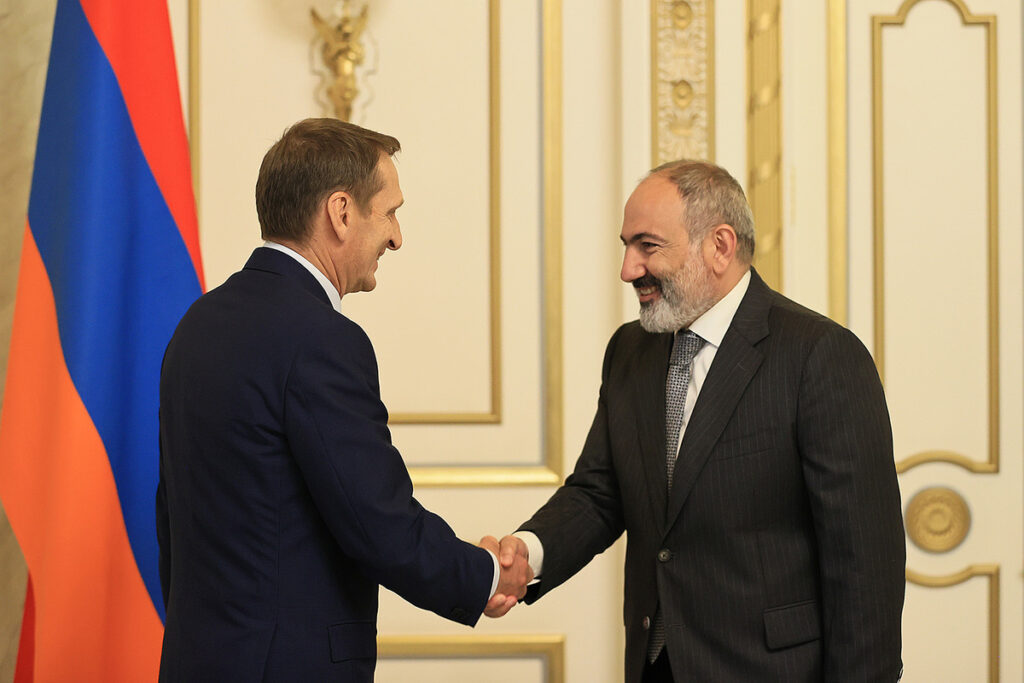
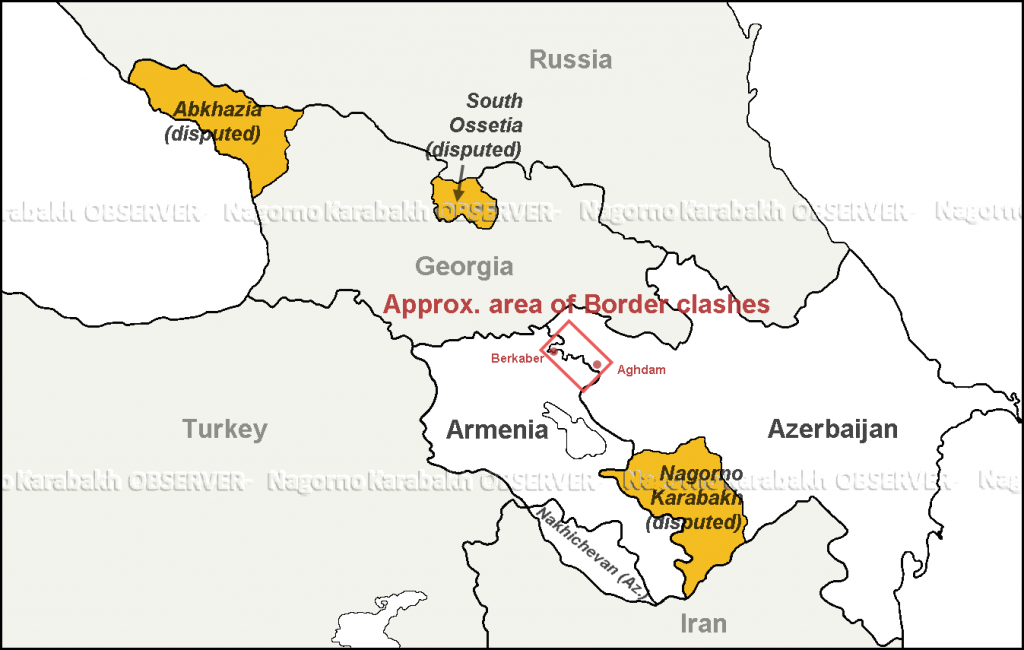
More on this story: Escalatory symptoms in South Caucasus: risks for Azerbaijan
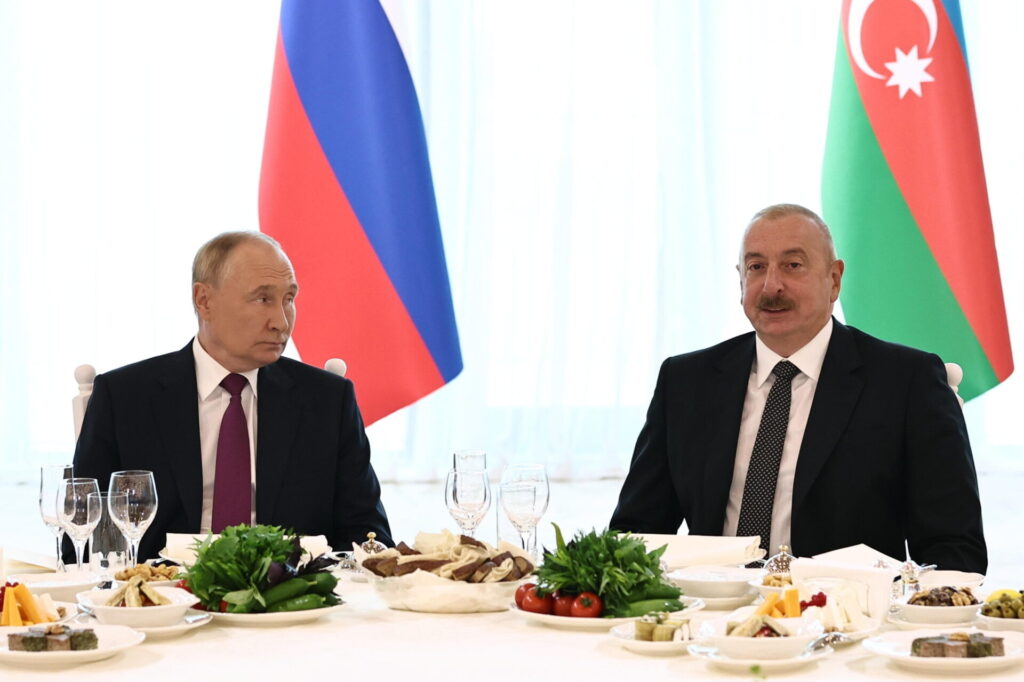
More on this story: The Waning Grip: The Decline of Russia’s Foreign Policy in the Global South
